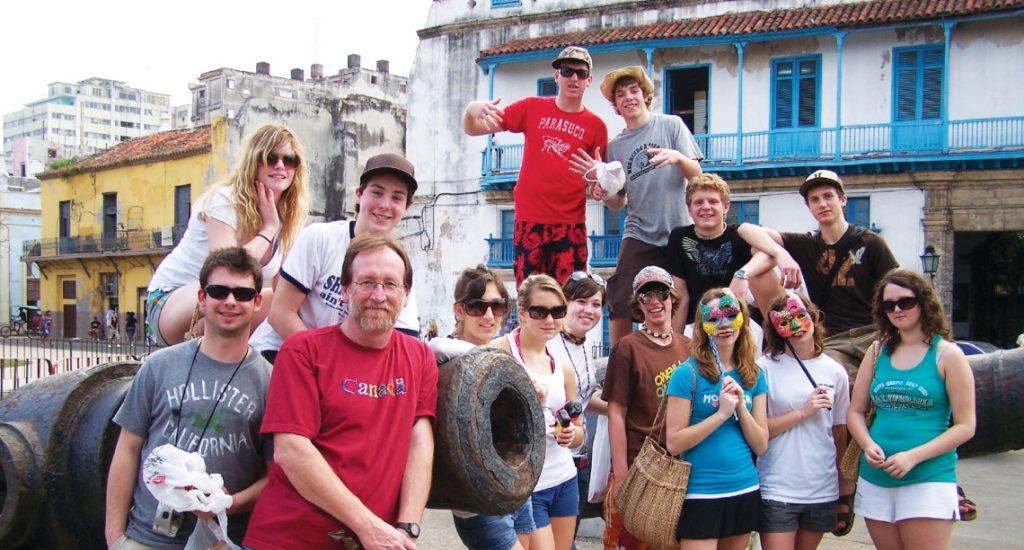The world is Germain Landry’s classroom. The Canadian Academy of Travel and Tourism (CATT) coordinator and teacher at St. Mary’s Secondary School (SMSS) in Cobourg, Ontario milks every opportunity to expose his students to practical experiences, providing a lush educational landscape that his students will draw on no matter where life takes them.

Grade 10 Students in Cuba.
Building relationships is a key component of the SMSS CATT program. The reciprocal relationship between the grades begins when the grade 10 students take part in a trip planned by the senior students. The seniors, eager to provide the blend of education and adventure of their own grade 10 trip, are responsible for everything including the itinerary, rooming lists, thanking suppliers and problem-solving. “Because it’s a real trip, the assignment changes from a normal graded task to a big deal,” says Landry. By the end of the trip, most of the grade 10 students have succumbed to the travel bug and are eager to plan the trip for their successors.
Furthering the contact between juniors and seniors, the grade 11 and 12 students interview the grade 10 students for places in the Gold Level CATT program. The senior students meet with the school principal, organize advertising, set up interview dates, and plan a parent meeting for students who apply. The seniors gain practical experience in conducting an interview, learning to interpret the candidates’ answers and body language. The junior students often impress the seniors. “The seniors often ask me, ‘Where did you get such awesome grade 10 students?’” laughs Landry.
Relationships aren’t confined to the school campus. When Landry takes students on field trips, he invites tourism professionals to speak to students about their occupations. The short, spontaneous talks typically cover education and career path, the best and worst parts of the job, and in general or specific terms: salary. No one has ever turned down the opportunity to connect with Landry’s students. Students have heard from individuals like a guide company owner, a night manager at a Niagara Falls hotel, and a Montreal hotel manager. “The best talk was given by a guide at a Cuban cigar factory,” says Landry. “She bonded immediately with our group, weaving information and humour into her talk. The students fell in love with the way she used her charm and voice to communicate clearly and effectively and they saw firsthand the skills and personality needed to succeed as a guide.”
The trip to Cuba illustrates the evolution of the SMSS CATT program. The first grade 10 trip that Landry planned was to Kingston, Ontario. Since then, students have travelled to British Columbia, Prince Edward Island, Cuba, Germany and Italy. Was the first group disappointed in their destination considering their counterparts travelled across Canada and Europe? Not in the slightest. With their enthusiastic promotion of Kingston as a destination, you would think they had travelled to Kingston, Jamaica!
While the SMSS CATT students gained an international perspective through their exchanges to Germany, much of their experience with the tourism sector occurs in the Cobourg area. Landry’s membership in the Northumberland Tourism Advisory Committee (NTAC) opens many doors for his CATT students. They participate in numerous tourism events in their hometown and they have access to workshops on topics like marketing and Internet advertising. Through the NTAC, Landry has been able to arrange co-op placements and employment with local tourism businesses; experience that adds strength to his students’ résumés.
Enhancing the added value of the SMSS CATT program further, Landry partnered with the Ministry of Education to connect with Fleming College and launch a dual credit Tourism program in 2006. In September 2009, seventy students enrolled to obtain a college and high school credit in Culinary/Foods or Hospitality. Students also benefit from certification in Service Excellence, Smart Serve, Food Safety, and CPR.
Landry says that his students are interested in a variety of careers, some within the tourism sector and some in other areas. SMSS CATT graduates have gone on to become chefs, travel agents, pilots and food and beverage writers. Landry is confident that the CATT training will equip his students with the tools they need to succeed in whatever career path they choose.
When it comes to his own future, Germain Landry is contemplating retirement in a few short years. He is looking to mentor the next CATT coordinator and teacher to facilitate a smooth transition for the SMSS CATT program. An avid traveler, Landry would love to encounter a SMSS CATT graduate while on vacation and see that they have discovered success and happiness working in tourism. “It would give me great pleasure to chat with them and know that in some way I helped them find their career path,” concludes Landry.
ABOUT THE AUTHOR
Erika Cuccaro
Erika Cuccaro is a Project Manager of Marketing and Communications for the Canadian Tourism Human Resource Council (CTHRC), a national organization that addresses labour market issues and promotes professionalism in the Canadian tourism sector. For more information on the CTHRC’s CATT program, please email info@cattcanada.ca, call 613-231- 6949, or visit www.cattcanada.ca.
This article is from Canadian Teacher Magazine’s September 2010 issue.









